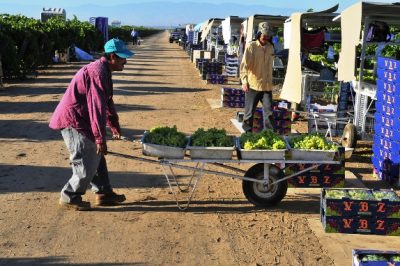Immigration Reform
The last time Congress updated our legal immigration system was November 1990, one month before the World Wide Web went online. We are long overdue for comprehensive immigration reform.
Through immigration reform, we can provide noncitizens with a system of justice that provides due process of law and a meaningful opportunity to be heard. Because it can be a contentious and wide-ranging issue, we aim to provide advocates with facts and work to move bipartisan solutions forward. Read more about topics like legalization for undocumented immigrants and border security below.
Federal Judge Rules to Keeps Key Provisions of Alabama’s Restrictive Immigration Law
Today, U.S. District Judge Sharon Blackburn ruled to keep many of the key provisions in HB 56, Alabama’s restrictive immigration law recently challenged by the Department of Justice (DOJ) and civil and immigrant rights groups. While Judge Blackburn ruled to enjoin some provisions of HB 56, she found that the DOJ and civil and immigrant rights groups did not meet “the requirements for a preliminary injunction” in its claim that major provisions—such as the section requiring schools to determine the immigration status of students’ and their parents’—are preempted by federal law. Signed by Governor Robert Bentley in June, HB 56 was challenged by civil rights groups, religious leaders and the DOJ on the basis that the law interferes with the federal enforcement of immigration laws and places undue burdens on local schools and federal agencies. Read More

GOP Candidates Distort Truth on In-State Tuition for Unauthorized Students
Texas Governor Rick Perry, a candidate in the Republican presidential primaries, has been taking a lot of conservative heat lately over his support for the “Texas DREAM Act.” That bill, which Perry signed into law in 2001, allows young unauthorized Texans who came to this country as children to qualify for in-state tuition in state colleges and universities in the same way as their lawfully present peers. Perry says that supporting the bill was an act of mercy towards unauthorized youth who had no say in the decision of their parents to come to the United States without permission. He also says that it is in the best interest of the state to educate unauthorized children rather than consigning them to the margins of society. Read More

Despite Lamar Smith’s Claims, E-Verify Is Not a Jobs Bill
BY TYLER MORAN, NATIONAL IMMIGRATION LAW CENTER While Chairman Lamar Smith (R-TX) promises that his mandatory E-Verify legislation (HR 2885) is a jobs creation bill, the mark-up of the bill in the House Judiciary Committee last week proved that it is anything but. Though the bill passed the committee by a 22-13 party line vote, the debate in committee and amendments offered make it crystal clear the bill would actually yield job losses. The debate leading up to the committee mark up also shows just how fractured conservatives have become on this issue—and much of it focuses on concerns over jobs. In fact, an unlikely coalition of progressive and conservative organizations joined together to oppose the bill, turning a host of job arguments upside down. Read More

Bridging the Ethnic Generation Gap: Why an Aging Population Will Depend on a New Generation of Workers
There is a generation gap in the United States and it is not only a difference in age. It is a difference in color as well. The predominantly white Baby Boomers are just this year beginning to reach retirement age. As they leave the labor force and the tax base over the next two decades, a new generation of Latinos and Asians will take their place in the U.S. economy as workers and taxpayers. It is the tax dollars of these immigrants and children of immigrants which will sustain the Social Security and Medicare programs upon which the Baby Boomers will rely. And it is these immigrants and children of immigrants who will become the doctors, nurses, health aides, and countless other workers upon whom so many aging Baby Boomers will depend. Read More

Give Me Your Tired, Your Poor, Your Huddled Masses…But Don’t Let Them Work?
Every year, thousands of people flee persecution in their home countries and seek safe haven in the United States. Many of them spend their entire savings on the journey, travel under life-threatening conditions, and arrive on our shores with not much more than the clothes on their backs. Those who are lucky find long-lost relatives, compatriots, or religious communities who help them get back on their feet. Then they begin the process of applying for asylum, which often takes years. Fortunately, our laws allow asylum seekers to obtain work authorization if their cases are not decided within 180 days. The 180 days, however, are counted by an “asylum clock,” which is too often stopped for unwarranted reasons. Read More

Mandatory E-Verify: An Enforcement Proposal Even Conservatives Don’t Like
Rep. Lamar Smith may find himself whistling in the wind this week as members of his own party continue to blast his E-Verify proposal. Smith’s bill, The “Legal Workforce Act” H.R. 2885, which continues to get marked up this week by the House Judiciary Committee, would make E-Verify mandatory nationwide. Conservative lawmakers, Tea Partiers, and Libertarians, however, fear that E-Verify—a electronic system that allows employers to verify work eligibility by checking employee data against Social Security Administration records—will violate civil liberties, hurt small businesses, and destroy the agriculture industry which relies heavily on undocumented labor. Read More

Better Immigrant Integration Leads to Economic Growth
Over the weekend, more than 27,000 people became American citizens during 285 naturalization ceremonies held across the country in honor of Citizenship Day (September 17). Becoming a citizen, however, is hard work. A new country, new rules, high costs, and little targeted support for new immigrants make what should be a journey of exploration and opportunity one that may be frustrating and lonely. Not surprisingly, problems such as these are a major obstacle to naturalization. Scholars note that despite the steady rise in naturalization rates over the decades, a shocking number of people do not naturalize are actually eligible to do so. In 2008, for example, while more than one million LPRs naturalized, more than eight million were eligible to do so. Developing better integration programs, however, may improve naturalization efforts and lead to economic growth. Read More

Improving the Naturalization Process: Better Immigrant Integration Leads to Economic Growth
Anyone who has ever attended a naturalization ceremony cannot help but be moved by the power of the moment. The participants enter as men, women, and children of diverse countries, but leave the room as citizens of one—the United States. For many, the path to that naturalization ceremony has been long and arduous, irrespective of whether they entered the United States as wealthy entrepreneurs or as refugees with nothing but the clothes on their backs. The process of obtaining lawful permanent resident (LPR) status, and ultimately U.S. citizenship, is often daunting. A new country, new rules, high costs, and little targeted support for new immigrants makes what should be a journey of exploration and opportunity one that may be frustrating and lonely. Consequently, in order to focus on ways to improve the naturalization process itself, we must take a step back and consider the nature of immigrant integration in the United States. The better our integration policies—and the sooner they begin—the more likely we are to improve the rate of naturalization. Read More

Lamar Smith’s E-Verify Arguments Defy Logic and Lack Evidence
Facing opposition from the left and the right, Rep. Lamar Smith appears to be willing to do and say just about anything to pass his “Legal Workforce Act,” (H.R. 2885), which would make E-Verify mandatory for all U.S. businesses. Smith continues to tout E-Verify as a magic bullet that will create jobs for millions of American workers despite all evidence to the contrary. Read More

Lamar Smith Introduces New Agricultural Twist to His Anti-Immigrant Agenda
Rep. Lamar Smith (R-TX), Chairman of the House Judiciary Committee, has added a novel new twist to his anti-immigrant agenda: letting more immigrant workers into the country. In defiance of logic, the man who believes that immigrants merely steal jobs from U.S. citizens now wants to import migrant agricultural workers. At a hearing today of the House Subcommittee on Immigration Policy and Enforcement, Rep. Smith rolled out his latest legislative proposal, called the “American Specialty Agriculture Act” (H.R. 2847). The bill would create a new “H-2C” visa for temporary agricultural workers to replace the existing H-2A program, and would allow growers to bring in up to 500,000 of these workers each year. Read More
Make a contribution
Make a direct impact on the lives of immigrants.
